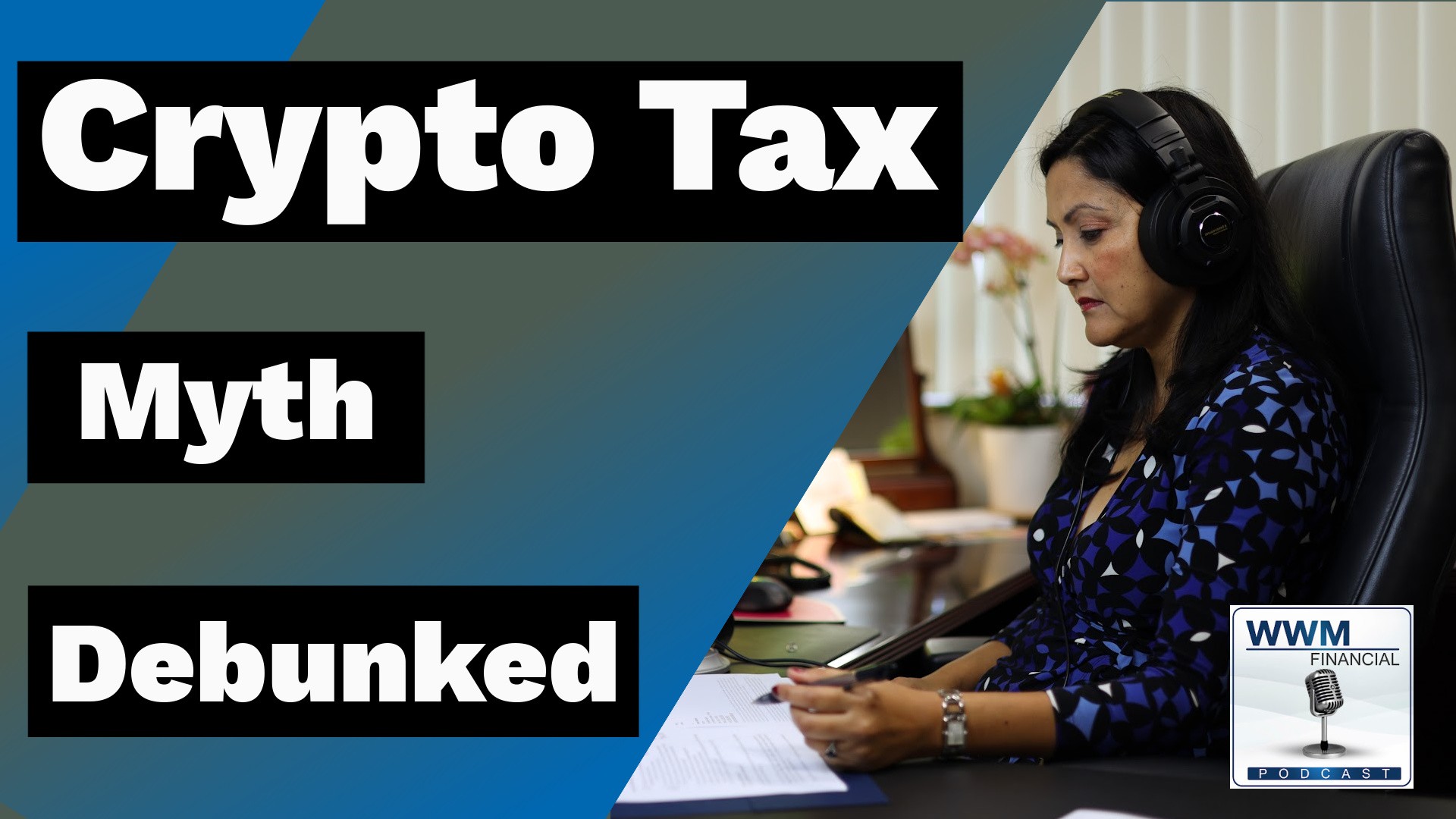
Truth About Crypto Taxation
Click on the image above to watch this video.
Truth About Crypto Taxation
Have you made a mistake with cryptocurrency and not planned for the taxes? Learn how to understand the tax implications surrounding cryptocurrency without understanding the tax code. This little-known podcast helps you understand your taxes from trading cryptocurrencies.
__________________________________
FREE Report: 5 Investing Secrets Every Investor Needs to Know Avoid making bad investment decisions, this little-known report reveals 5 better ways to invest in stocks.
Click Here to get your free report. DISCLAIMER:
DISCLAIMER:
WWM Financial is an SEC- Registered Investment Adviser. Advisory services are only offered to clients or prospective clients where WWM Financial and its representatives are properly licensed or exempt from licensure. Investing involves risk and possible loss of principal capital. No advice may be rendered by WWM Financial unless a client service agreement is in place.
__________________________________
Full transcription below:
Steve Wolff:
Well, welcome to today’s podcast on cryptocurrency taxation. I’m Steve Wolff. I’m here with my partner, Catherine Magana. We’ve got a special guest here today who actually knows something about crypto taxation, because we certainly don’t and that’s Josh Cahan, who’s a CPA, graduated from University of North Carolina in Charlotte and with, I believe it was a finance taxation degree. Is that right?
Josh Cahan, CPA:
Accounting degree.
Steve Wolff:
Accounting degree, and then you started your own firm. Tell us a little bit about yourself, Josh.
Josh Cahan, CPA:
Sure. After graduating from college at UNCC, I just went on to work at several accounting firms to kind of get my feet wet and just decided to go off my own. I’ve been doing it for over 20 years now.
Steve Wolff:
All right. How long have you actually been doing crypto?
Josh Cahan, CPA:
That has really started around 2017. That’s when I really started to get into it and that’s had a huge impact on investing and now it’s kind of growing and growing as you can tell right now.
Steve Wolff:
Exactly. Well the crypto market’s been growing. Let’s get started a little bit. The first question I have is, why does somebody need a special CPA for crypto taxation?
Josh Cahan, CPA:
That’s a great question, Steve. One of the biggest things about taxes is, they usually have guidance and people have been doing taxes forever and it’s pretty straightforward for the casual person doing tax returns. But now with crypto taxes, there’s not a lot of guidance. There’s a lot of gray area and that is one of the main parts that I get clients is they say, “Well, I know I’m supposed to be taxed on income, but how do I do it?” That’s really the start of a conversation from there.
Steve Wolff:
When you say guidance, you’re talking about from the IRS.
Josh Cahan, CPA:
Exactly. Correct.
Catherine Magaña, CFP®:
Josh, what is the number one myth or misconception that people have that are investing in cryptocurrency when it comes to crypto taxes?
Josh Cahan, CPA:
I think the biggest thing about crypto is all the noise that you have in this crypto world, if you want. You get information from the government that don’t want it. You have big investors like Warren Buffet that say it’s bad. There’s just a lot of miscommunication and misinformation, so people don’t know. They get all this news from the media saying, there’s hacks and scams and people are losing Bitcoin or Bitcoin is down 50%. There’s a lot of negativity and misinformation. I think that’s one of the big things that when you look at the crypto world, it’s not all negative. There’s a lot of good to it. I think that’s one of the misconceptions is that, people don’t take the time to really learn about what it really is.
Catherine Magaña, CFP®:
We see now a lot of big companies, I was just reading Microsoft, PayPal, Whole Foods, Starbucks, Home Depot, Etsy are taking payments now from Bitcoin. Can you elaborate a little bit about that, maybe on the other end of it? Obviously that’s a transaction if you’re buying a good and the taxation on that.
Josh Cahan, CPA:
Right. This is kind of the part that really doesn’t make a lot of sense from tax purposes, because if they want to use this coin, you’re basically saying you have a taxable transaction. For me, it’s one of those things that people have to take in consideration that, it’s not just like buying a car with cash. If you’re buying a car with Bitcoin, there’s an extra step and you have to kind of report it. That’s kind of where I come in to advise you saying, “Hey, you need to report, this. This is what you need to do.” It’s just an extra step.
Steve Wolff:
Josh, what happens if you don’t report it?
Josh Cahan, CPA:
Well, you’re supposed to, that’s the big thing. As my advice to a CPA, when you’re dealing with it, just know what you’re supposed to be doing and go to see an advisor and you’re supposed to report it because it’s a taxable transaction. Go ahead.
Steve Wolff:
How does the IRS know about your crypto in the first place?
Josh Cahan, CPA:
Well, they can subpoena records from whoever that gets these transactions, and I’m not a technical person, but basically the transactions can be easily traced if you have the right information.
Steve Wolff:
Is that because of the blockchain technology?
Josh Cahan, CPA:
Exactly. It’s all open out there. Anybody can see it. You might not see exactly who it’s going to, but you can trace where it’s going. That’s one another big misconceptions, if you will, that the IRS can’t find it. Well, they can, they don’t really want you to know that. But they can find it if they want to.
Steve Wolff:
So big brothers, a lot they’re watching. Is that what you’re saying?
Josh Cahan, CPA:
That’s exactly. It’s just a harder step to get, but it’s not like cash where it’s gone, it’s harder to trace, but if the Bitcoin, it’s out there on the internet where you can trace it.
Catherine Magaña, CFP®:
Is there any software or something that people could use to kind of track some of these types of investments using the cryptocurrency that you know?
Josh Cahan, CPA:
Yes, there definitely is. It really kind of depends on what platform you’re using, what kind of trading you’re using. The problem is, there are so many different ones out there. There’s so much new technology and investment vehicles in this world that it’s hard to keep up with.
Steve Wolff:
It’s funny you said that because as I was preparing for this particular podcast, I was looking, everything has its own language. Every business has its own language. I started looking at things like Airdrops and Hard Forks and then DeFi and NFTs and mining and staking rewards and all that. I have no idea what most of this stuff even is.
Josh Cahan, CPA:
Right. Most of that stuff is new. To try to get the government, that is typically slow to react to these things, to give guidance is the problem. The other thing is, when people come to us, they need us to advise them. I think that’s important for us as advisors to say, “Look, there’s a way that we can knock out the noise and focus on what’s good for your investment types.” I think that’s important for all of us to understand that, there’s a different terminology and it’s new, but it’s coming and it’s here. It’s going to be here for a while, so we might as well kind of learn to live with and actually help our clients.
Catherine Magaña, CFP®:
I think it’s interesting because, once again, going back to the transactions and if more companies start using Bitcoin or different cryptocurrencies, then the investor really needs to track and have records. Because once again, they’re going to be tax consequences on this and the IRS is going to want to get paid or they’re going to their taxes on that. I just think it’s interesting in what’s to come. I definitely think the reporting or having somebody that’s working with you to help you navigate through this is definitely important. Could you mind sharing a little bit about maybe I guess, a lot of people that own cryptocurrency or Bitcoin, or also there’s this Stablecoins, perhaps there’s some interest and they obviously need a report on that as well. Do you mind commenting on that a little bit?
Josh Cahan, CPA:
Sure. I guess just for a general purpose is when we’re talking about taxable transactions is, if you go and buy Bitcoin with Fiat or cash, that’s not a taxable transaction. If you use Bitcoin to buy a different coin, then that is a taxable transaction. Now, it’s a lot easier to buy these coins now than it used to be. You can have a lot of transactions that you’re buying that you’re accumulating these coins, where you don’t have to pay taxes. That’s your point of the Stablecoins and interest. There are coins that you can stake, if you will. That is a taxable transaction that you need to record. It’s kind of just like dividends or interests on a regular money market.
Catherine Magaña, CFP®:
Just making sure people understand, like you didn’t just buy this Bitcoin and let it go. Obviously, there’s other factors and things that you want to bring to your CPA to work with you and help you make sure you’re reporting. Because I think once again, sounds to me that a lot more people are investing in this type of currency and it’s just making sure that they understand what’s the tax consequences.
Josh Cahan, CPA:
Definitely. Especially when the interest rates are a lot higher than what you can get at a bank or savings. I mean, it’s nice.
Steve Wolff:
It seems like record keeping is really crucial here and correct me if I’m wrong. Well, actually, maybe I should ask the question. If you buy something on one platform, first of all, can you sell it on another? And if you do, how do you track all this?
Josh Cahan, CPA:
That’s a good question. When you transfer a coin to a different exchange or wallet or whatnot, it’s not a taxable transaction right there because you’re just moving funds to a different vehicle basically, or a different platform. There’s nothing taxable there. It’s just when you sell that coin or you swap it for a different coin, that’s when it’s becomes taxable. Now the tracking, all these softwares for the tax softwares, they can use different technology to bring that transaction into the computer software where it can match the transactions of the buying and the selling. Like right now, there’s tax softwares that do a really good job about that. Every year they’re getting better and better about it, because there’s just so more transactions. Yes, it’s almost impossible to do it without tax software.
Steve Wolff:
Which software do you think is the best one to use?
Josh Cahan, CPA:
Like I said before, though, it really depends on you, what you’re investing and how you’re doing it. One of the better ones is Koinly, spelled with a K instead of a C and that’s good for individual investing. That’s one.
Steve Wolff:
K-O-I-N-L-Y?
Josh Cahan, CPA:
Yeah, that’s one. There’s some other ones that I use just for my purposes, like Lukka and Ledgible and then there’s CoinTracker and Cointrader and ZenLedger. I mean, you really have to know your investor and you need to know what coins and platforms they’re using because different ones specialize in different items.
Steve Wolff:
I know this hasn’t been around very long, the whole cryptocurrency thing, but has it been around long enough? I’ll get it out. Has it been around long enough that you’ve had the IRS maybe come to you and say, “You can do this or you can’t do this,” or are they still kind of in the dark about what’s going on?
Josh Cahan, CPA:
Well, they do have some notices on the IRS webpage, so that’s kind of a guidance. It’s very loose in a lot of things that are happening now. There’s just a lot of things that like the NFTs that are out and there’s a lot of gray areas. But from one perspective they do say, “Hey, this is taxable and you got to record it.” But the gray areas are, “well, we don’t know exactly all the time where to put that.” Even the question on the tax return this year was confusing that you had to mark if you were dealing in transactions with crypto, which makes sense. If you read it, you’re like, okay. Then if you go into it further, they’re saying, “Well, if you’re just buying it, that doesn’t really count,” but that doesn’t make any sense because you are actually doing something. Even they are really kind of confusing and that’s why it would be great if the miscommunication, if they could get it clear and hopefully they will within a couple years.
Steve Wolff:
I’m a little curious, if a CPA or your tax person doesn’t really have a background in this, how do they do your taxes?
Josh Cahan, CPA:
Right. I guess this kind of goes back to what we are supposed to do as tax return people. Basically, you’re giving us the information and we report it. We have to take your word for it. Now of course, over the years, the IRS has put more and more pressure on professionals about making sure that’s the right information, but it’s really up to the individual to make sure that they know what they’re investing in and at least record it on a tax software and get it to the appropriate people or ask questions.
Catherine Magaña, CFP®:
Josh, do you mind talking a little bit about the cryptocurrency tax rate? Obviously, the fluctuations in current cryptocurrencies and potentially maybe investors don’t realize that there might be paying ordinary income or do you mind just elaborating a little bit on that just with the tax return?
Josh Cahan, CPA:
I guess real quickly, and we’re talking about investors right here, not traders or people doing business that, that’s their business doing trading. It’s more you and me just casual investors. Basically, you kind of follow the capital tax rules for that. Kind of depends on whatever income you’re in, that you get the tax preferred long term capital rates, either zero, 15 or 20, or if you’re short term, then you’re just ordinary income tax rates.
Catherine Magaña, CFP®:
I was thinking that’s important to know, especially if you bought in and then you traded, obviously the market, the fluctuations, that investment. So just making sure that they understand potentially it could be ordinary income.
Josh Cahan, CPA:
Exactly.
Catherine Magaña, CFP®:
And being able to pay that tax later.
Josh Cahan, CPA:
Sure.
Steve Wolff:
It sounds like the IRS is trying to treat this like any other transaction as far as capital gains, losses, et cetera, is that right?
Josh Cahan, CPA:
Right. I mean, what they really want is people to report this. Because I think there’s another misconception that everybody is making tons of money in crypto, which is not really true. It’s just so new that they don’t know. They’re trying to see what people are doing because you can invest a small amount of money in crypto, keep trading it a thousand times each month and that’s a million dollar transactions, but it’s really not. It’s only a thousand dollars. You’ve kept on trading over and over again. They’re saying millions of dollars. Well, it’s not really because it’s only a thousand dollars trading back and forth all the time for an individual. They get these big numbers in their head that maybe some people do it, but the actual gain or loss is probably minimal.
Josh Cahan, CPA:
That’s when I’m seeing a lot of people come to me and say, “I got this IRS notice. I’ve traded three million dollars in crypto, and there’s no way I’ve only invested maybe five grand.” I was like, I know. That’s why you have to put all this documentation. You have tens of thousand of line items on the tax return saying, “That was a dollar, that’s another dollar.” Hopefully they can see that not a lot of people are doing that. There’s not a lot of dollars there. It’s just, I guess the transaction part of it, because a lot of people that invested early want to hold it so they can even make more money later on.
Steve Wolff:
If you wanted to gift crypto, is there a limit to how much you can gift without paying taxes?
Josh Cahan, CPA:
Well, it’s just kind of like the same gifting rules that we have for everything else. I mean, I think it was like 15 grand that you can actually gift to somebody without having a tax return done. They follow the same rules and that’s basically what we’re looking at for most of the tax transactions. If they don’t have something special for crypto, then it falls back into what there’s normally a taxable item.
Steve Wolff:
What about something like the non-fungible tokens, the NFTs? I’m glad that was funny.
Josh Cahan, CPA:
No, it’s not funny because it’s one of those things that, like you said, it’s new and they have no guidance on really how it should be taxed. You kind of have to fall back and say, “All right, what exactly is this? Is this a digital asset or not?” Without getting too complicated, there’s not really a clear answer. You could go between capital gain or collectable tax rates. It really depends. You have to look at the transaction and that’s just for investors, that’s not a special classification for dealers or people that are in the business of dealing with art. It’s a lot.
Catherine Magaña, CFP®:
I mean, I know obviously there’s different states, we’re obviously in California, but is there anything that we should be thinking about on a state level or is it just kind of state by state, we have to look?
Josh Cahan, CPA:
It’s definitely state by state, but it’s also, most of the states either follow the federal, so it’s like one of those other things. It’s just, well, if it doesn’t classify it as anything, then you just treat it how it normally is treated each state, unfortunately. Although the Federal’s kind of a mess already, I would hate to see the states get involved to make it even more so.
Steve Wolff:
I know the answer to this question and you probably have a bias, but should people be trying to do this on their own, as far as doing the taxation in reporting?
Josh Cahan, CPA:
They can. I mean, if you have one or two trades. I mean, you just have to know what you’re doing. I mean, it’s like anything else, you have people that are way more computerized and savvy than some other people that say, “Hey, I can do this and import all these information,” but other people don’t and they don’t want to have the time either to deal with it or just don’t want to do it, because it does get tricky and it’s unusual and it’s unclear too. If you feel uncomfortable, there’s many taxation people or softwares that you can go to. It’s just that it’s beneficial if people would have like advisors that would say, “Hey, this is a good person to do it.” Instead of just kind of going off on their own without help. With all the noise and information out there, it’s kind of hard sometimes to just pick up and say, “All right, I’m going to Google.” Then you just have to go through the process of finding out. I’m happy that you’re trying to have people educated on what’s going on because it’s an interesting place.
Steve Wolff:
All right. We’re also trying to educate ourselves because this is so new.
Catherine Magaña, CFP®:
Josh, you mentioned it earlier, but the IRS, the rules are always changing. You might do it this way this year and the next year it could be a little different. Just in general, things change over time. That’s why I think even for us, in our business, and dealing with clients and different rules and regulations that come down our way, it might be one way one year and the next year it’s different. So just having a professional staying on top of it like yourself, I think is extremely important.
Josh Cahan, CPA:
Yes, definitely. I totally agree with you. It will always be changing.
Steve Wolff:
Bottom line, do you have any parting thoughts for us as far as what to do with your taxation of crypto?
Josh Cahan, CPA:
I think one of the things is just try to get as good information as you can. Try to focus on the good part about it and not just the crazy negativity that’s usually in the media. I think that’s one of the big things. Also, I think most people realize that when you make income, it’s going to be taxable. There are people that don’t want to do it, and some people or most people I think, want to do it. They want to not be in trouble with the IRS. It’s a pain and it’s not fun. It’s one of those things that, Hey, just take care of your business and live your life without someone else watching over your back.
Steve Wolff:
I know I said that was kind of the last question, but you just got something going in my brain. In the beginning with crypto, it seemed to me that people said, if you were a criminal, you could do crypto and get away with all this stuff. But it seems like you can’t because everything is tracked. What’s your comment on that?
Josh Cahan, CPA:
Yes. I mean, I’m not into the criminal investigation part of everything, but yes, it’s definitely, I think more and more people are realizing that, Hey, it might have been easy to get that, but now that you have it, they can watch you. So it’s going to be hard to get rid of it. I think it’s like you said, the traceable part is huge and I think more and more people are going to realize that it’s going to be difficult. It’s not going to be easy.
Steve Wolff:
Well, we really appreciate you coming on today. And this is Josh Cahan, who is a CPA in what city in North Carolina?
Josh Cahan, CPA:
Charlotte, North Carolina.
Steve Wolff:
You’re in Charlotte. So you get to see all the good basketball games.
Josh Cahan, CPA:
That’s right.
Steve Wolff:
All right. Well, thanks again.
Josh Cahan, CPA:
Thank you, Steve.
Steve Wolff:
All right.
Josh Cahan, CPA:
Take care.
Catherine Magaña, CFP®:
Thanks Josh.
Steve Wolff:
Catherine, thank you.
Josh Cahan, CPA:
Thank you, Catherine.
Steve Wolff:
We’ll talk to everybody next time. Thank you.








